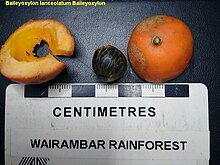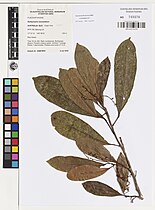Baileyoxylon
| Baileyoxylon | |
|---|---|

| |
| Fruit and seed | |
| Scientific classification | |
| Kingdom: | Plantae |
| Clade: | Tracheophytes |
| Clade: | Angiosperms |
| Clade: | Eudicots |
| Clade: | Rosids |
| Clade: | Fabids |
| Order: | Malpighiales |
| Family: | Achariaceae |
| Genus: | Baileyoxylon C.T.White[2][3] |
| Species: | B. lanceolatum
|
| Binomial name | |
| Baileyoxylon lanceolatum | |

| |
Baileyoxylon is a monotypic genus in the family Achariaceae. The sole described species is Baileyoxylon lanceolatum which is restricted to a very small part of the Wet Tropics of Queensland. It was described in the mid 20th century.
Description
[edit]Baileyoxylon lanceolatum is an evergreen tree growing up to about 25–30 m (82–98 ft) tall with medium grey bark and branchlets that are covered in rusty brown hairs.[4] The dark green leaves are rather thick and measure up to 16 cm (6.3 in) long by 5 cm (2.0 in) wide, with 7–10 pairs of secondary veins either side of the midrib.[5][6][4] They are obovate to oblong in shape, acuminate (pointed) at the tip and cuneate (tapering) at the base, and they have a relatively long 2 cm (0.79 in) petiole.[5][6][4]
The much-branched inflorescence can reach up to 10 cm (3.9 in) long and is also covered with rusty brown hairs.[5][4] The small flowers are about 5 mm (0.20 in) long and have 5 petals. The globose orange fruit is, in botanical terminology, a berry containing one or two seeds. It measures around 3 cm (1.2 in) diameter.[5][6][4]
Taxonomy
[edit]This species was first described in 1940 by the Australian botanist Cyril Tenison White, based on material collected by the botanical collector S. F. Kajewski from two individual trees in 1929.[4] White's paper, titled "A new genus of Flacourtiaceae (Pangieae — Hydnocarpinae) from tropical Queensland", was published in the Journal of the Arnold Arboretum in January 1941.[4]
Etymology
[edit]The genus name Baileyoxlon was created by White in honour of the American botanist Irving Widmer Bailey, who provided much assistance to White in identifying the taxonomic placement of this new species.[4]
Distribution and habitat
[edit]The natural range of Baileyoxylon lanceolatum is a small area of upland rainforest on the eastern part of the Atherton Tableland, in the vicinity of Mount Bartle Frere. The total area of occupancy is just 116 km2 (45 sq mi).[7] The habitat is very wet mesophyll vine forest.[5][8]
Conservation
[edit]This species is listed by the Queensland Department of Environment and Science as least concern.[1] As of 19 October 2023[update], it has not been assessed by the International Union for Conservation of Nature (IUCN).
Gallery
[edit]-
Herbarium sheet
-
Herbarium sheet
References
[edit]- ^ a b "Species profile—Baileyoxylon lanceolatum". Queensland Department of Environment and Science. Queensland Government. 2022. Retrieved 19 October 2023.
- ^ a b "Baileyoxylon lanceolatum". Australian Plant Name Index (APNI). Centre for Australian National Biodiversity Research, Australian Government. Retrieved 19 October 2023.
- ^ a b "Baileyoxylon lanceolatum C.T.White". Plants of the World Online. Royal Botanic Gardens, Kew. 2023. Retrieved 19 October 2023.
- ^ a b c d e f g h White, C.T. (1941). "A new genus of Flacourtiaceae (Pangieae — Hydnocarpinae) from tropical Queensland". Journal of the Arnold Arboretum. 22 (1): 143–144. doi:10.5962/p.185424. Retrieved 18 October 2023.
- ^ a b c d e Jessup, L.W. (2022). "Baileyoxylon lanceolatum". Flora of Australia. Australian Biological Resources Study, Department of Climate Change, Energy, the Environment and Water: Canberra. Retrieved 19 October 2023.
- ^ a b c F.A.Zich; B.P.M.Hyland; T.Whiffen; R.A.Kerrigan (2020). "Baileyoxylon lanceolatum". Australian Tropical Rainforest Plants Edition 8 (RFK8). Centre for Australian National Biodiversity Research (CANBR), Australian Government. Retrieved 19 October 2023.
- ^ "Spatial Portal". Atlas of Living Australia. Retrieved 24 October 2023.
- ^ "Rainforests". Wet Tropics Management Authority. Queensland Government. Retrieved 24 October 2023.
External links
[edit] Data related to Baileyoxylon lanceolatum at Wikispecies
Data related to Baileyoxylon lanceolatum at Wikispecies Media related to Baileyoxylon lanceolatum at Wikimedia Commons
Media related to Baileyoxylon lanceolatum at Wikimedia Commons- View a map of historical sightings of this species at the Australasian Virtual Herbarium
- View observations of this species on iNaturalist
- View images of this species on Flickriver
- Information about the collector S. F. Kajewski


